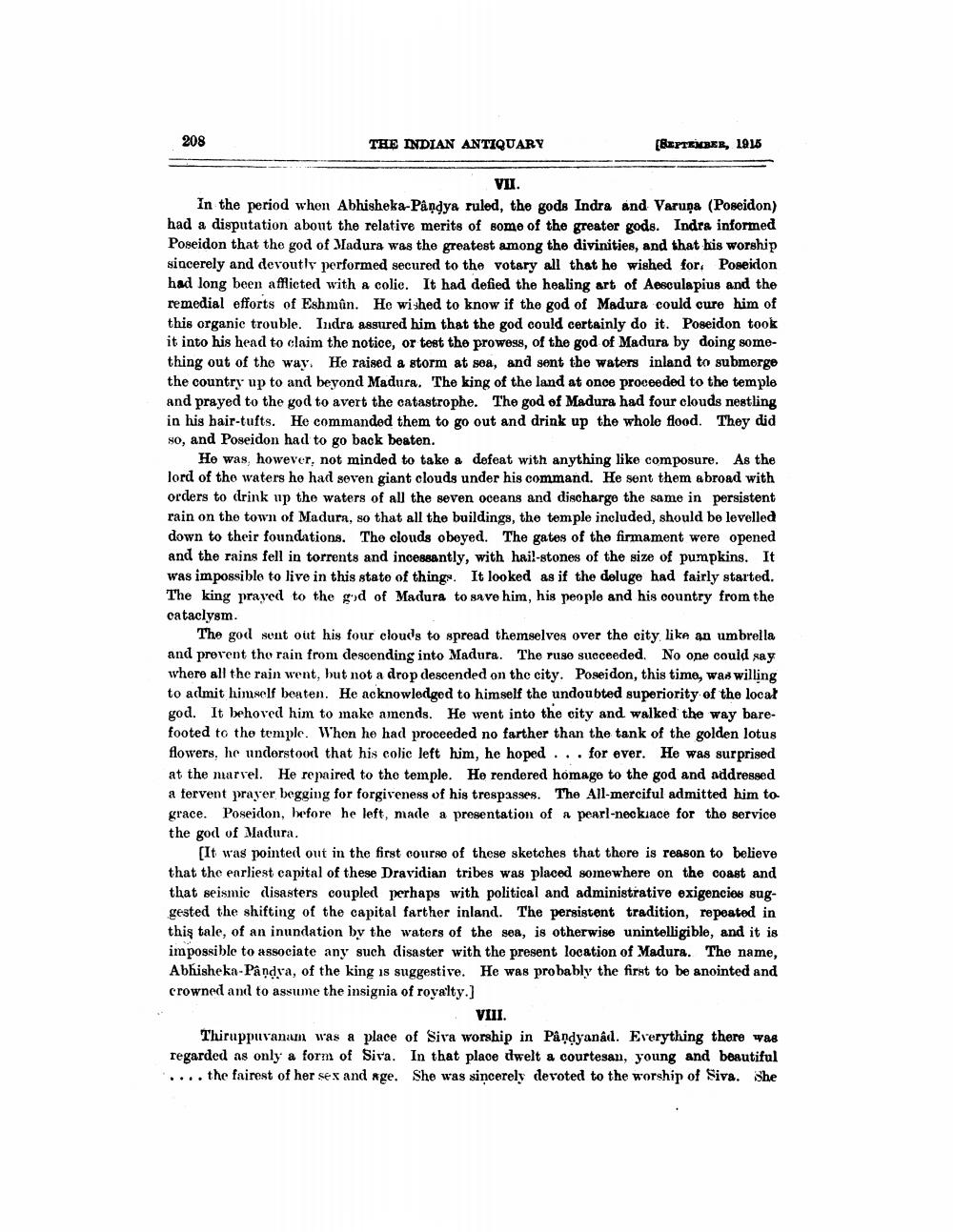________________
208
THE INDIAN ANTIQUARY
[SEPTEMBER, 1915
VII.
In the period when Abhisheka-Pandya ruled, the gods Indra and Varuna (Poseidon) had a disputation about the relative merits of some of the greater gods. Indra informed Poseidon that the god of Madura was the greatest among the divinities, and that his worship sincerely and devoutly performed secured to the votary all that he wished for. Poseidon had long been afflicted with a colic. It had defied the healing art of Aesculapius and the remedial efforts of Eshmûn. He wished to know if the god of Madura could cure him of this organic trouble. Indra assured him that the god could certainly do it. Poseidon took it into his head to claim the notice, or test the prowess, of the god of Madura by doing something out of the way. He raised a storm at sea, and sent the waters inland to submerge the country up to and beyond Madura. The king of the land at once proceeded to the temple and prayed to the god to avert the catastrophe. The god of Madura had four clouds nestling in his hair-tufts. He commanded them to go out and drink up the whole flood. They did so, and Poseidon had to go back beaten.
He was, however, not minded to take a defeat with anything like composure. As the lord of the waters he had seven giant clouds under his command. He sent them abroad with orders to drink up the waters of all the seven oceans and discharge the same in persistent rain on the town of Madura, so that all the buildings, the temple included, should be levelled down to their foundations. The clouds obeyed. The gates of the firmament were opened and the rains fell in torrents and incessantly, with hail-stones of the size of pumpkins. It was impossible to live in this state of things. It looked as if the deluge had fairly started. The king prayed to the god of Madura to save him, his people and his country from the cataclysm.
The god sent out his four clouds to spread themselves over the city like an umbrella and prevent the rain from descending into Madura. The ruse succeeded. No one could say where all the rain went, but not a drop descended on the city. Poseidon, this time, was willing to admit himself beaten. He acknowledged to himself the undoubted superiority of the local god. It behoved him to make amends. He went into the city and walked the way barefooted to the temple. When he had proceeded no farther than the tank of the golden lotus flowers, he understood that his colic left him, he hoped... for ever. He was surprised at the marvel. He repaired to the temple. He rendered homage to the god and addressed a fervent prayer begging for forgiveness of his trespasses. The All-merciful admitted him to grace. Poseidon, before he left, made a presentation of a pearl-necklace for the service the god of Madura.
[It was pointed out in the first course of these sketches that there is reason to believe that the earliest capital of these Dravidian tribes was placed somewhere on the coast and that seismic disasters coupled perhaps with political and administrative exigencies suggested the shifting of the capital farther inland. The persistent tradition, repeated in thiş tale, of an inundation by the waters of the sea, is otherwise unintelligible, and it is impossible to associate any such disaster with the present location of Madura. The name, Abhisheka-Pandya, of the king is suggestive. He was probably the first to be anointed and crowned and to assume the insignia of royalty.]
VIII.
Thiruppuvanam was a place of Siva worship in Pandyanâd. Everything there was regarded as only a form of Siva. In that place dwelt a courtesan, young and beautiful .... the fairest of her sex and age. She was sincerely devoted to the worship of Siva. She




